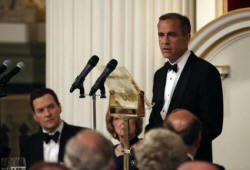|
 Carney
signals earlier British rate rise, sterling soars Carney
signals earlier British rate rise, sterling soars
 Send a link to a friend
Send a link to a friend
[June 13, 2014]
By David Milliken
LONDON (Reuters) - Britain
could become the first major economy to tighten monetary
policy since the 2008 financial crisis, Bank of England
Governor Mark Carney signaled, sending sterling shooting
to a five-year high against the dollar on Friday.
|
|
 Government bond yields soared, construction stocks tumbled and
interest rate futures priced in a first hike by December after
Carney said rates could rise sooner than financial markets had
thought - his most hawkish signal to date. Government bond yields soared, construction stocks tumbled and
interest rate futures priced in a first hike by December after
Carney said rates could rise sooner than financial markets had
thought - his most hawkish signal to date.
"There's already great speculation about the exact timing of the
first rate hike and this decision is becoming more balanced," Carney
said in a speech late on Thursday. "It could happen sooner than
markets currently expect."
Relatively few economists had expected rates to increase until the
second quarter of next year given the central bank's previous long
term "forward guidance". The increase would be the first since July
2007.
Carney said Britain's economy still had scope to grow without
pushing up inflation, which stood at 1.8 percent in the year to
April. But he saw little sign yet of a slowdown in the pace of
expansion that the central bank had penciled in for the second half
of the year.
This brings into view one or more interest rate rises before a
general election due next May - something that could hurt the
Conservative and Liberal Democrat coalition by raising mortgage
costs for home-owners at time when the Labour opposition is
highlighting the cost of living.

The pound sterling hit a 5-1/2 year high against a trade-weighted
basket of currencies. Short sterling rate futures fell <0#FSS:>,
pricing in the first hike by December. The interbank interest rate
curve (SONIA) also pointed to a rate rise by the end of the year,
compared with the first quarter of 2015 on Thursday.
"The BoE seems to be slightly ahead of the Fed as far as rate hikes
are concerned," said Lutz Karpowitz, currency analyst at Commerzbank.
The U.S. central bank is still sending a dovish message that rates
will remain low for an extended period.
Rob Wood, chief UK economist at German bank Berenberg, said Carney's
shift reflected the British economy's buoyancy.
"It is flying now. Employment is rising at a record pace and we see
no sign of economic growth slowing from its current approaching 4
percent annualized pace," Wood said.
Speaking alongside British finance minister George Osborne, Carney
also said the central bank would carefully weigh the merits next
week of tackling housing market risks, including an undesirable
loosening in mortgage underwriting standards.
Osborne said he would grant the BoE new powers to impose maximum
loan-to-value and loan-to-income ratios on mortgage lending, which
Carney welcomed in his speech to London's financial community.
[to top of second column] |

RATE RISE NEARING
Last month, a minority of BoE policymakers said the case for a rate
rise was "more balanced" and that interest rates might need to
increase sooner rather than later to ensure they did not need to
rise sharply.
But Carney had until now appeared less keen to contemplate
tightening, emphasizing that Britain's economy was still a long way
from full strength.
On Thursday, he said that more important than the timing of a first
rate rise was that future increases be "gradual and limited", in
part due to high household indebtedness and a drag on growth from a
stronger currency.
He also said the timing of a rise would depend on incoming data, and
the bank had no fixed plan on when to raise rates.
Britain's record current account deficit was not an immediate cause
for alarm, he added, but it was only sustainable to borrow from
abroad to fund investment, not consumption.
"Excessive reliance on consumption or non-tradable sectors, such as
housing, all financed by borrowing abroad at an over-valued exchange
rate, would prove only temporarily satisfying," he said.
Carney said he was also concerned by signs that mortgage lending
standards were becoming looser and set out the case for early action
by the BoE's Financial Policy Committee, which meets next week, as
insurance against future risks.
(Writing by David Milliken and Guy Faulconbridge; Additional
reporting by Kate Holton, Andy Bruce, Anirban Nag and Tricia Wright;
Editing by Paul Taylor)
[© 2014 Thomson Reuters. All rights
reserved.] Copyright
2014 Reuters. All rights reserved. This material may not be
published, broadcast, rewritten or redistributed.
 |